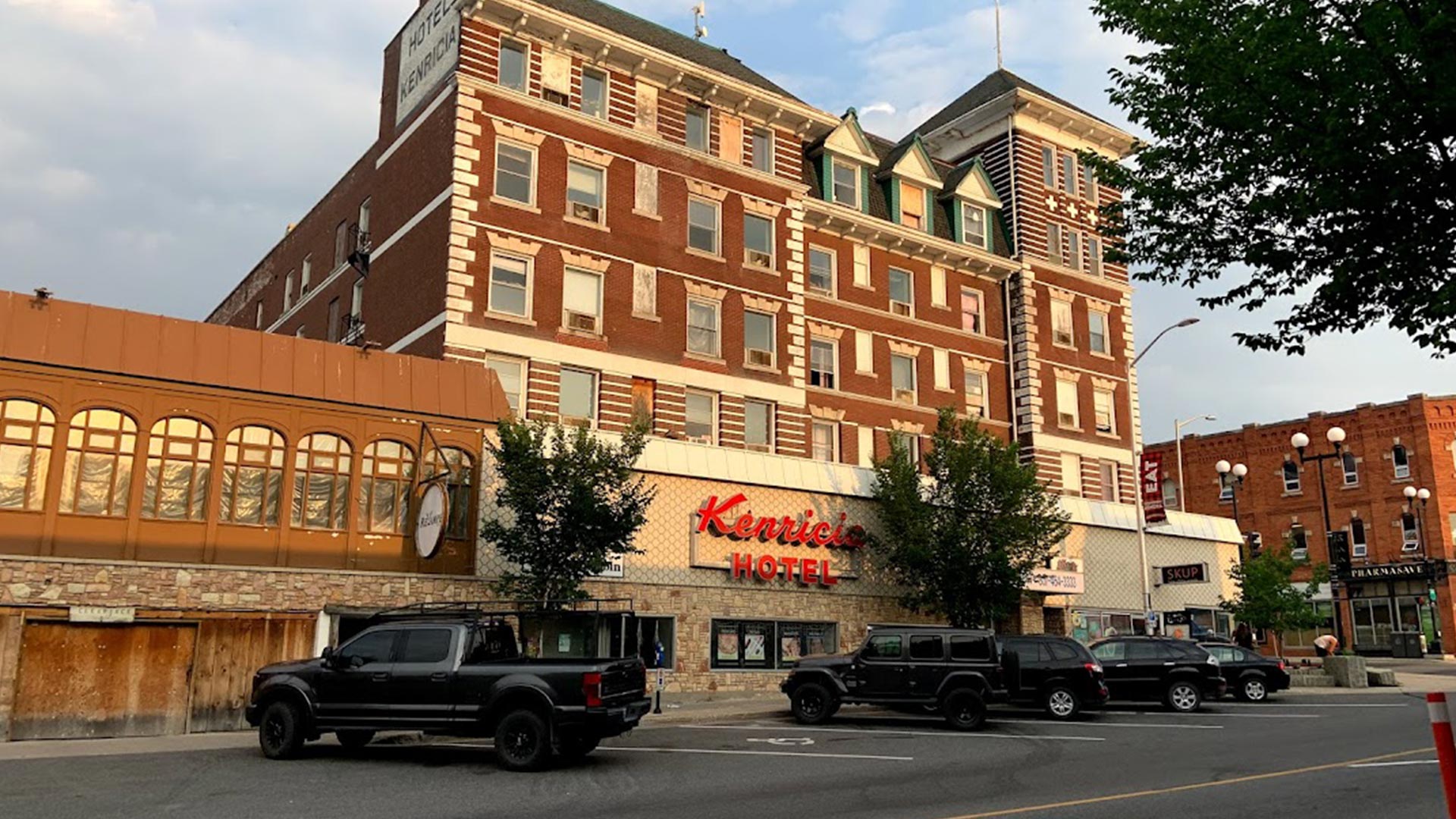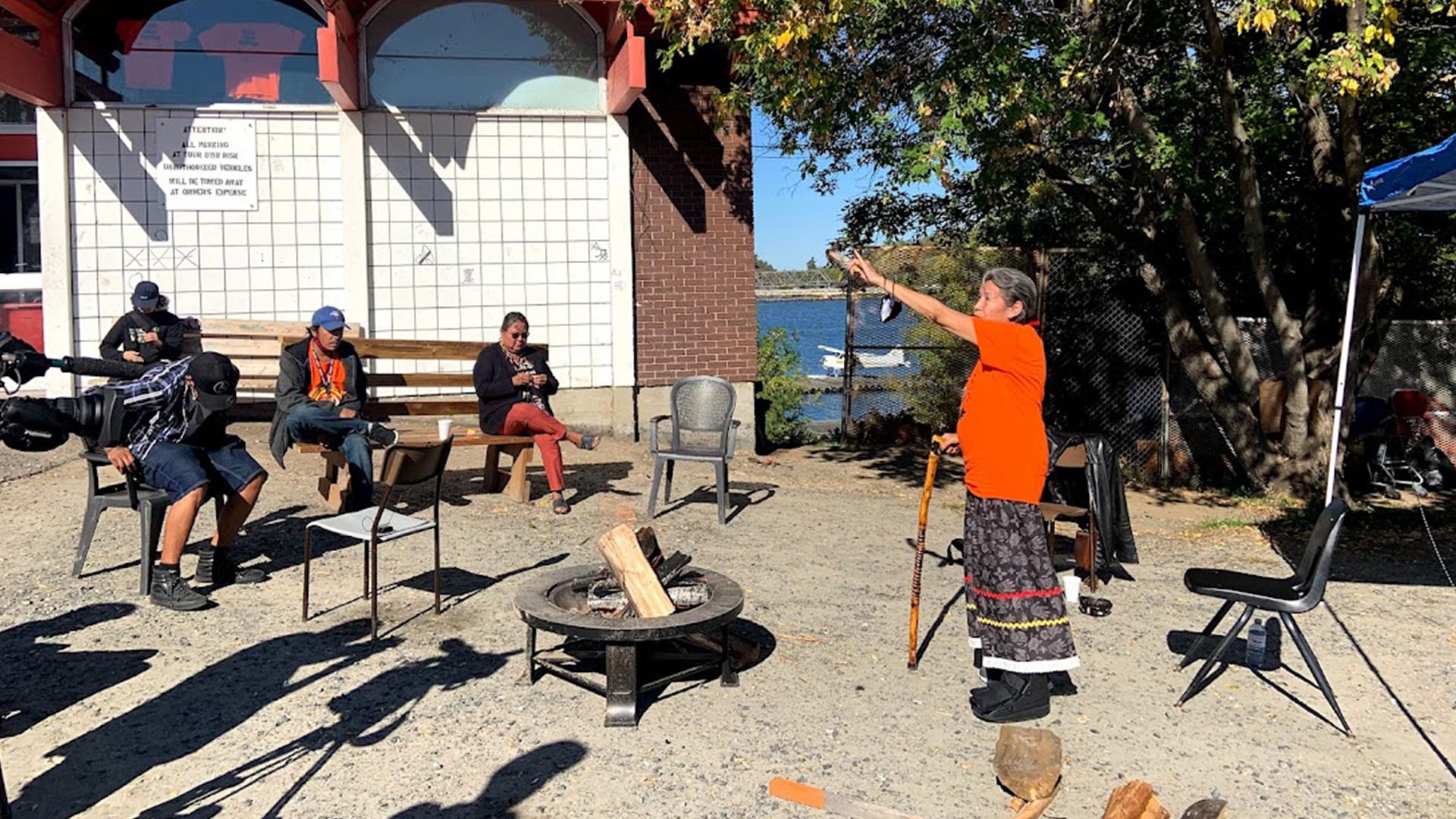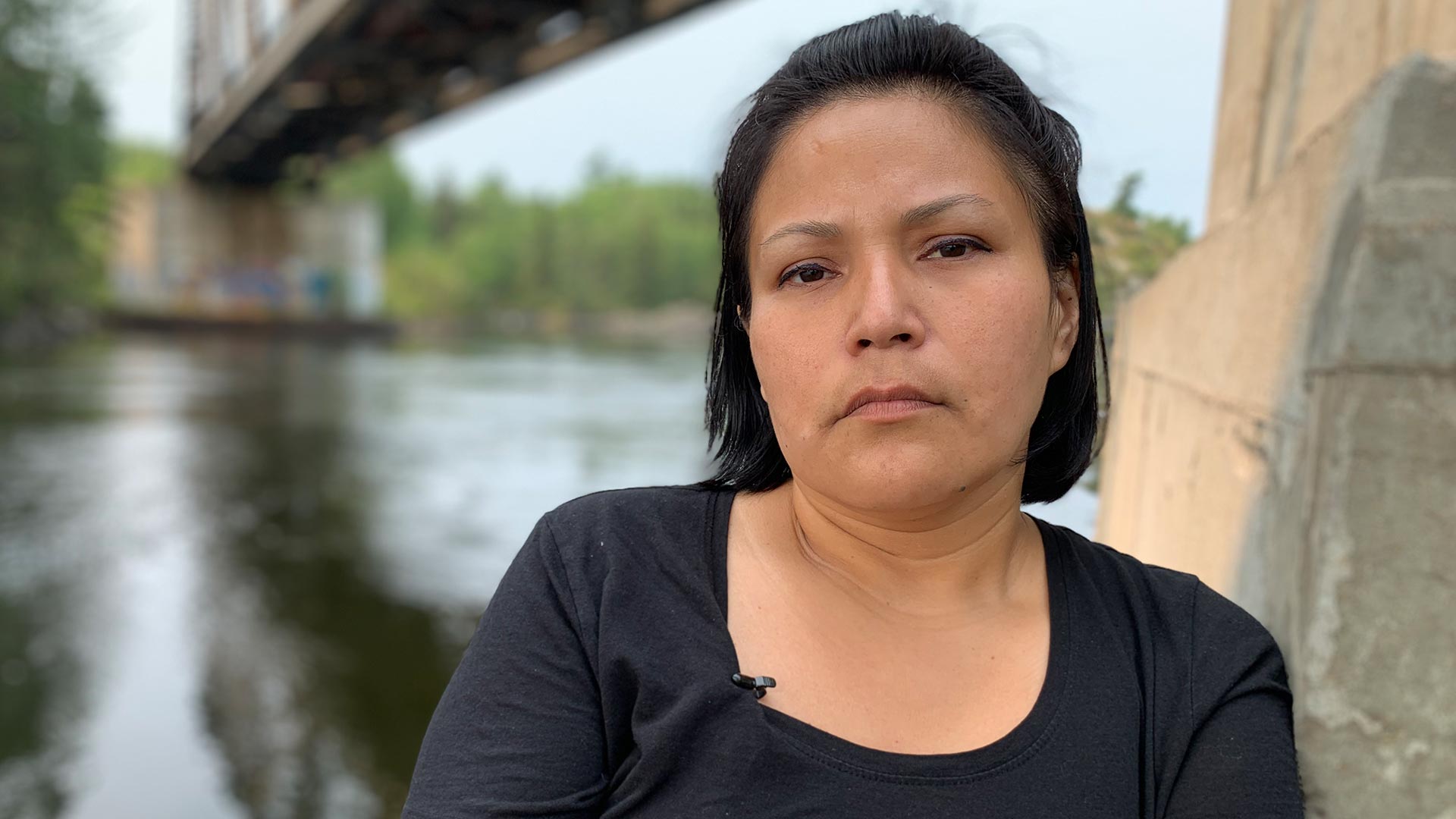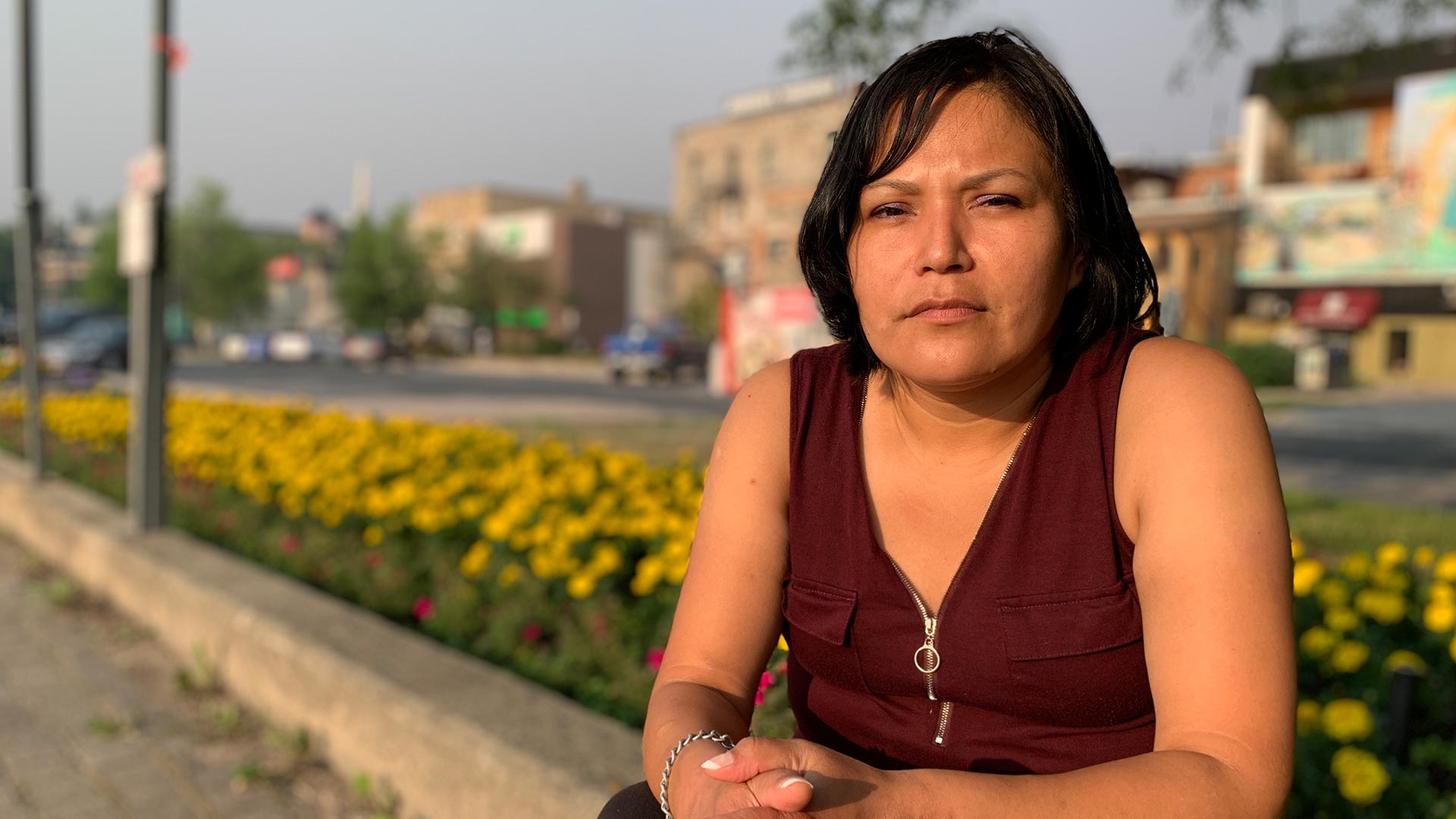For the first eight years of Ruth Machimity’s life, she lived in a stable home.
Then her father started drinking.
And then he got violent.
She remembers some nights waking up in the arms of her older brother, Patrick, carrying her to safety.
“He didn’t want me to be around my father when he was like that,” she says.
A few years later when Machimity was 11, Patrick was hit by a train and killed.
“Losing him was like losing my rock.”
After that day she’d run like hell taking off from home for weeks on end.
“No one ever came looking for me. No one ever came to say to go home.”
Less than a year later she was sexually assaulted.
This is Ruth Machimity as a child.
The moments when she was broken.
Her rock gone and she fell like one.
Taking anything to numb the trauma.
Shuffled between foster homes, detention facilities and treatment centres.
Ending up on the streets of Winnipeg at age 16 with nothing but addiction following her everywhere she went like a dark passenger cloaked in the trappings of trauma.
She’d soon run with gangs.
Later she got married.
Even raised a family.
But never sober.
And she was never in control.
She eventually left her family behind in Sioux Lookout in 2014.
The dark passenger taking her to Kenora and the sex trade where she was introduced to some of the town’s most powerful people.
Soon Machimity says she ended up at the door of an officer for the Ontario Provincial Police.
And again, and again and again.
Saying he and all her clients looked to gratify themselves – whether they knew it or not – with the trauma of a First Nations woman.
Hustling every day to pay for a $200-a-day drug cocktail of meth and opioids.
She first sold herself, then helped others do it.
All in a supposedly quaint northern town where the sex trade is played out on the streets.
And for a few years, she ran them.
This is Ruth Machimity as an adult, at least one she used to be.
She recently celebrated being sober for 20 months. Culture has kept her steady during her healing journey.
And one day in July she wanted to come clean about her life during a chance encounter with two reporters from APTN Investigates, which airs tonight on APTN.
That fateful meeting would soon spark the OPP to launch a criminal investigation into one of their own and lift the lid on Kenora’s dark underbelly.
In Plain Sight

Kenora, Ont. – The traditional territory of the Metis and Anishinaabe of Treaty 3.
A scenic town, resting along the Lake of the Woods, about 210 kilometres east of Winnipeg, Man.
Bustling with vacationers and cottagers in the summer months.
But the streets tell a different story.
It’s where the sex trade plays out.
There are no escorts, no websites, unlike other, larger cities.
Often it’s as simple as word of mouth and who you know.
That’s how Ruth Machimity, 43, got her start on the streets of Kenora.
“From there, I did meet a lot of individuals who were willing to give me the money I need for the acts they wanted. And just from throughout the years, meeting different people and just having that disgusting, dirty feeling of having to perform sexual acts with people for money,” she said.
“There are people in this town who want to be able to make that phone call, or to meet up down the road, and pick them up here and there and everywhere.”
Machimity said other women she met on the street first judged her for doing what she did.
But they saw she was getting money to buy drugs and they were sitting around “sick” from withdrawal.
“A few of the girls would come and say, well how do you do that? I said, well, I’ll introduce you to somebody. So I did that a few times, but then I realized, you know what? This is basically cutting into my profit because if I’m handing out my sugar daddies to somebody else, they’re making the money, I’m not getting anything.
“So I started to say, you know what? If I’m going to hook you up with somebody, I need something. That’s kind of where that started,” said Machimity.
She said most of her clients were older white men and all the sex workers Indigenous women.
Each battling their own dark passengers that led them into alleys, random cars and hotels.
“I didn’t really have to recruit or find them, they found me. And again, I’d go with the person to see if they were comfortable. A lot of the times, I had to sit there and watch basically, because the girl didn’t want to be by herself.
“So they’d do what they do, because I left it up to them whether or not they wanted me there. But the john didn’t have a choice, whether or not I was there, the girl did,” she said.
She said some men in Kenora would ask for minors but she always refused to help them.
That doesn’t mean the men didn’t find other ways to lure young girls.
“You don’t necessarily have to be 18 to have an addiction, and to want to feed that. And if they could figure out at a young age, that they can use their bodies to do it, they’ll do it,” said Machimity.
Yvonne Bearbull has heard stories from vulnerable Indigenous women.
Bearbull is the executive director of the Kenora Fellowship Centre – a safe zone for vulnerable people.
“Efforts need to be made to ensure that they are safe from exploitation, violence, racism and discrimination, right? That those are heavy issues that continue to be in this community,” said Bearbull.
Local men target Kenora’s safe zone

The centre has been a staple in the community since the 1960s.
Bearbull sat down with APTN in September next to a sacred fire with a bag of tobacco that she offered to everyone that came.
Sometimes she rolled cigarettes for those that wanted one.
“We have people who’ve come through the day school, Sixties Scoop. you know the whole range of traumas that our people have faced. And a lot of people who are young people dealing with aging out of the child welfare system. And, you know, we see the intergenerational trauma, we see the family, children in care starting to come here now right. They’re coming here, where their parents were and their grandparents were. So we see that cycle continuing,” she said.
Residential schools.
The Sixties Scoop.
Child welfare.
Trauma rippling across generations.
Bearbull knows the women that come to the centre are targets for sexual exploitation.
“And that’s something that we’ve tried to raise awareness about, you know the community healing that needs to happen. And everybody blaming our young women, our women for participating in that. But it takes two to make this happen, and so that awareness needs to be on them, too. But you never hear of that, you never hear of anybody being held accountable,” she said.
The centre is in the heart of the city, right next to the courthouse.
Bearbull said older white men will walk right up and lure women away – usually when their pension cheques arrive.
Women will disappear for a few days with these men.
“We know that there’s people in this community who think that it’s ‘survival sex’ or you know some people who think that these older white men – they care about [the women], you know, they want to try to help them, so [the men] let them go and stay there. But it’s always at a price right?” she said.
Survival sex.
It’s a term for sex work that preys on victims out of their extreme need.
Trading sex for food, a place to sleep, or, more commonly, because off addiction.
“We’ve taken pictures [of the men] and we’ve shared information with the OPP. But again it’s that willingness [of the women] to say what’s been going on, what’s happening,” said Bearbull.
Police know who the men are.
In fact, OPP Insp. Jeffery Duggan said they’ve gone to the men.
“We certainly do know there are men that do that, and we know who they are. Really, Kenora is not a big enough city to not know who they are. We’re not Toronto, we’re not Winnipeg, you know they can’t disappear to a different section of town and we never see them,” said Duggan, who is the top cop in Kenora.
“So we do know who they are, and we know who the women are, and that’s where the engagement part comes in, with the girls that are being taken by those men. But it really is dependent on those people coming forward to say, this is what’s happening to me.”
But Bearbull said she’s heard other stories from women.
Ones about cops also targeting these women.
“Sometimes I’ve sat and listened, and really couldn’t believe what I was hearing. It’s not my place to say whether they were right or wrong, but I’ve heard them and I did my best to let them know that I believe them. And it was always their choice if they ever wanted to do anything about it, right?” she said.
While the exchange of money or services for sex is legal in Canada it’s not for police officers in Ontario.
The provincial Police Services Act restricts such behaviour and that includes the OPP.
But no victim has ever come forward, according to Bearbull.
That is until now.
And her name is Ruth Machimity.
‘When is your curfew?’

Machimity didn’t immediately identify anyone that paid to be with her when she first met with APTN.
She struggled with being a “rat” – a way of life for a street hustler that she was still having trouble letting go of.
You simply don’t talk about these things.
There’s a code.
But that wasn’t her life anymore.
“When I think about some of the individuals who, I guess required services, were people you would hold in high regard in society. I don’t know how else to put that,” she said in July.
Eventually, she did.
Some of those people were cops.
“I’ve probably encountered a handful of cops that are willing to pay for services. It’s sad to know that these individuals will prey on somebody like that. I don’t know how else to put that,” said Machimity.
She claimed that one officer is an active member of the OPP, who she said has been trying to pull her back into the life she fought hard to leave behind.
She shared Facebook messages with APTN that the OPP officer sent throughout the summer and into September.
“First it was small talk, like how are you doing? Are you doing okay? Are you still straight and sober? Are you still doing, are you still up to old habits? And as soon as he said old habits, I kind of got a sense of what he was talking about,” she said.
The two messages shared with APTN are exactly as follows.
“When is your curfew?” the OPP officer wrote in late August.
“9pm,” she replied.
“You wanna get together tomorrow,” he wrote, again.
“Or…..right now.”
Then he wrote again in September.
“Got time today?”
Machimity replied: “Sorry heading out to Wash Bay to help take down and build a sweat lodge.”
The next day he wrote again.
“Today?”
“After 2 yes,” she replied. “Have a Dr appointment at 1pm.”
“Ok.”
Four hours later he wrote back.
“So?”
And this is where it was difficult for Machimity.
She was tempted to do it.
She said she even went over to his house several times but couldn’t go through with it.
She said the officer made it clear to her that he wanted her to find other women for him.
“It’s not until we are actually talking [in person] that he will say, well if you’re not going to assist me, can you find somebody else to assist me? He won’t come right out and say what he wants. But because of what I used to do, you kind of have to read between the lines with all that.
“He just knows the proper slang and terminology for everything,” said Machimity, who described the structural layout of the officer’s home.
But she never did “assist” him and said she strung him along.
Machimity said each time she went to his house in the wide swath of her addiction it was always the same sexual acts.
She recalled the first time.
“I sat down afterwards thinking I was going to get paid but he just walked me to the door,” she recalled. “I was there 10-15 minutes.”
Machimity didn’t ask for payment.
The second time the OPP officer did pay her she said.
“As I was walking out the door he slipped me a brown bill and a red bill. $150,” she said.
“And he also said ‘I will always have your back.”
She said this meant if she kept coming back when he called he’d take care of her if she ever needed it.
She’d go back several more times, not only for this protection but because he was a cop who knew what she was up to on the streets and could jam her up if he wanted.
Then one day she said he did pay her back for all her services.
APTN confronts OPP with allegations against officer

APTN took Machimity’s claims in part, with her approval, to the OPP.
We never identified her or the officer involved during a ride-along with the Insp. Jeffery Duggan.
“This woman is on record … naming the officer and saying this is what I did with him while he was an officer, and he still is. How do you get around that, when there is stories like that of your own officer partaking in that life?” Duggan was asked.
“Well clearly, that’s the first I’ve heard of it. I have never heard that before. But that’s something that, if it was reported to the police, there are avenues that that would be investigated. And I talk about oversight agencies for policing services, the Special Investigations Unit would be notified right away.
“But that’s certainly something that I do take an interest in, of course, and not something that I like to hear. But if it is happening, we need to know about it, so that we can deal with it,” said Duggan.
“If you’re talking about police officers engaging in that, we have a Police Services Act (PSA), that prohibits that. It’s about on-duty and off-duty conduct. And there certainly is criminal laws that speak to that, but there’s certainly the Police Services Act that speaks to that as well.”
The officer was never on duty during any of the encounters said Machimity, which apparently ruled out the SIU investigating.
And given the seriousness of the allegations and people involved it’s easy to see why victims of sexual exploitation don’t typically come forward.
Then there are people like Machimity.
She took her allegations to the OPP a few days following APTN’s interview with Duggan.
She gave two video statements over several weeks and provided the OPP with the same text messages as APTN.
She also provided in detail how she alleges the officer paid her back for sexual services.
On Nov. 1, the day Machimity celebrated 20 months of sobriety, the OPP notified the officer that he was under investigation – both criminally and internally.
Machimity also said the OPP served the officer with a restraining order to not contact her.
APTN isn’t naming the officer – or providing more details on how Machimity said the officer paid her back – as the OPP investigates.
APTN’s investigation also continues.
Machimity seeks forgiveness

As for Machimity, she explained meeting with the OPP was difficult.
She’s not used to being on the other side of the interrogation table. Usually, it was her being investigated for various crimes that saw her in and out of the Kenora jail.
But for the first time she can see her future, while also looking to her past and the pain she caused, particularly other women who got involved in the sex trade through her.
“I would like to say I’m sorry for the things I did to them or put into their head. But I think I’ve forgiven myself for doing that. And that’s the part of the perspective saying, you know what, yeah okay I did that, I take responsibility for it, but if I hold onto that guilt, or how it made me feel at the time, or how I thought I felt about it, if I hold onto it I’m not going to be able to let it go.
“I have to forgive myself before I can forgive anybody else,” she said.
She’s also thinks of her two children.
“I hurt my children deeply when I left and I know that I can never take back the time or the things I did, or when I did that,” she said.
“I’m sorry.”
It’s a journey of forgiveness that’s still far from over.
After all, she is still putting the pieces back together.
Next week: We learn more about how Machimity’s culture is keeping her sober and meet the people who have helped her. We also take a closer look at Kenora to find out if the “Kenora Indian Beaters” still roam the streets.
“Kenora hasn’t changed. The town has always been racist and still is. We couldn’t even walk the streets of Kenora. If you were only one Anishinaabe, walking the streets, sure as saying you’re my brother, you’d get beaten up,” said Elder Tommy Keesick.
Look for that story on Nov. 19.











